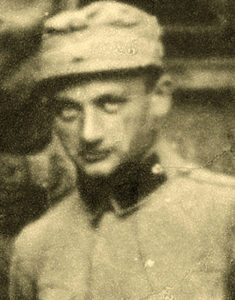 Furlough in Jablonovka by the Austrian-Jewish writer Joseph Roth (1894-1939) includes a description of Christmas just behind the front lines of the Eastern front during Roth’s time with the Austro-Hungarian army during the First World War (the translation is by Michael Hoffman, and comes from The Hotel Years, a fine collection of some of Roth’s writing):
Furlough in Jablonovka by the Austrian-Jewish writer Joseph Roth (1894-1939) includes a description of Christmas just behind the front lines of the Eastern front during Roth’s time with the Austro-Hungarian army during the First World War (the translation is by Michael Hoffman, and comes from The Hotel Years, a fine collection of some of Roth’s writing):
The sky glitters overhead, the snow glitters under our feet. It’s as though the sky is a reflection of the snow. There’s no point following the village street, which is all trampled. The snow was so seductive that it would have been a sin not to walk there, where it lay crisp and deep, noble, virginal, crystal and singing. So as not to encounter our comrades and to enjoy the night and the stars and the snow, we walked up the lane behind the houses. It was peaceful, no war anywhere. Ten or twelve times a searchlight crossed the sky, but even that seemed to be a kind of strolling, a peaceable pedestrian, paler than its brothers whom I knew better in the luminous sky.
The boys came in with their pumpkin lanterns. They sang. Stable and manger and donkey were nearby, if you could follow the singing. If you could believe them, the Saviour was born in Jablonovka, not far from Josefova Gargas’s hut, and not two thousand years ago, but sixty at the most, and the oldsters still remembered the event. You could practically see the footprints of the Three Kings in the snow. The star was graspable. The Podolian plain was swaddled in faith, God was in Podolia, and Bethlehem was a hop and a skip away, much closer than the front.
Lights went out one after another, and the huts went dark. Only the sky and the snow were still gleaming as the village traipsed up the hill to the church. Its double doors were thrown open, and it was as though the altar was coming out to meet you, to welcome the visitors in its splendour. There were no pews. People stood and knelt. Although the doors were left open, it soon grew warm, it was as though the furs were warming me, and the candles, and the fervour and the Gloria after the Introitus: Dominus dixit ad me: filius meus es tu, ego hodie genui te. Quare fremuerunt gentes; et populi meditate sunt inania? What are the heathens purposing? What folly are the peoples pursuing? — Et pastores erant in regione eadem vigilantes — And there were wakeful shepherds in that place — they were here next to us, next to Rainacher and me. We took the widow Josefova Gargas home between us. The door wasn’t locked, no door in the village was ever locked, even though strange troops, Hungarians and Bosnians were furloughed here. There were wakeful shepherds here.
We sat down at the table, and ate our borsch with wooden spoons. Then we cut up the meat with our bayonets. We drank slivovitz from tea-glasses and canteens. My atheistical friend Rainacher stretched comfortably on the chair, flung wide his arms and sang: Gloria in excelsis deo. He wasn’t blaspheming. At three in the morning, we kissed the widow and the twins, gave them our four parcels, and went off to sleep. You take the bed tonight, Rainacher told me, I’ll go on the floor. It’s my present to you. And that’s how it was. We were roused at six with marching orders.
Furlough in Jablonovka was written by Roth in exile in Paris in 1939. It first appeared in an émigré newspaper in that city, just a few months after his death the same year, a death accelerated by alcohol and despair over the deteriorating situation in Europe.

Thanks for this. Abashed to say that I’ve not yet read _The Radetzky March_. But it’s on my list!